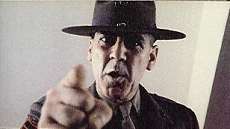 I
I was sad to hear about the death this weekend of economist John Kenneth Galbraith. I was exposed to Galbraith at a fairly young age by my father who had all manner of Galbraith's books in his big collection of political stuff. Galbraith, probably more than any other economist, was someone who made economics digestible to the average palate. Perhaps even more importantly; Galbraith presented a case that capitalism was best served when it functioned to benefit all elements of society.
The Affluent Society, probably his greatest work, shook the world when it came out in the 50's. In that book Galbraith argued that the measure of the wealth of society could not solely be sized in terms of personal wealth but also through the level of commitment to fighting poverty, public safety and infrastructure. It amounted to nothing less gauntlet drawn across the face of western society, particularly the United States. Galbraith challenged us to do better.
Just before I read of Galbraith's death I had been searching around looking for an article I'd read from
Parade sometime in the late 80's. The late, great astronomer Carl Sagan had written a piece proposing a joint manned Mars mission between the United States and the U.S.S.R. The benefits to such a mission were pretty self-evident; increased cooperation between the superpowers, joint scientific advancement, etc. but what really struck me about the idea and what's stayed with me to this day is Sagan's earnest belief that man as a species is coded to find a challenge to surmount, a new world to explore. A mission to Mars would be the ultimate challenge.
While I couldn't find that article I did find
this piece by Sagan published in 1992 in
The Planetary Report. Sagan summarizes man's exploration of our world and ties into a call to explore other worlds but recognizes that much of the spark of imagination that focused our nation towards these goals has all but disappeared from from public policy.
But since that time, something has soured. The anticipation of progress has been supplanted by a foreboding of technological ruin. I look into my children's eyes and ask myself what kind of future we are preparing for them. We have offered them visions of a future in which--unable to read, to think, to invent, to compete, to make things work, to anticipate events--our nation sinks into lethargy and economic decay; in which ignorance and greed conspire to destroy the air, the water, the soil and the climate; in which, with over 50,000 nuclear warheads still in existence, we permit a nuclear holocaust. The visions we present to our children shape the future. It matters what those visions are. Often they become self-fulfilling prophecies. Dreams are maps.
I do not think it irresponsible to portray even the direst futures; if we are to avoid them, we must understand that they are possible. But where are the alternatives? Where are the dreams that motivate and inspire? Where are the visions of hopeful futures, of times when technology is a tool for human well-being and not a gun on hair trigger pointed at our heads? Our children long for realistic maps of a future they (and we) can be proud of. Where are the cartographers of human purpose?
One of the oldest running disagreements between Mrs. Wormer and myself is over the financial cost of our national space program. Mrs. Wormer, being the bleeding-heart softy that she is, feels the dollars that go into the NASA budget are obscene and would be applied much better to poverty or jobs programs. I'm hugely sympathetic to this point but I don't quite see it the same way. I don't see it as either/ or. I see both as necessary. I see both as challenges. I dream that one day we'll end poverty AND reach for the stars.
The overwhelming thing that seperates men like John Kenneth Galbraith and Carl Sagan is that they look at the world as it is, not as they'd like it to be, and see the huge problems facing mankind yet see those problems as challenges; things to be conquered while other men turn away. There is a hairbreadth's difference between man conquering space and man conquering poverty or hunger. Both are the equivalent of the effort to circumnavigate the globe, or climb Everest or fly across the Atlantic. Both will take the application of enormous resources and imagination. Both offer hope.
To get there we'll need realize that we need to have leaders again that recognize that dreams are maps.
 I've been hesitant to link this Flash video Bravery which is set to James Blunt's moving song.
I've been hesitant to link this Flash video Bravery which is set to James Blunt's moving song.




































